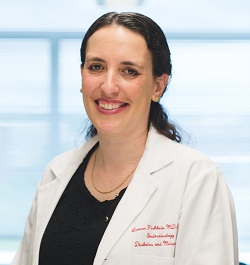Causes of Neuroendocrine Tumors
Home » For Patients old » NET Tests & Treatments » NET Causes

What causes neuroendocrine tumors?
We don’t know what causes neuroendocrine tumors. Most seem to develop sporadically. NETRF is actively researching the causes of NETs. Some risk factors for neuroendocrine cancers, however, can be passed down in families.
Inherited risk factors for NETs
Most cases of NETs are not associated with hereditary risk factors. Researchers estimate that inherited factors may be associated with 17% of PNETs26 and in 25% of pheochromocytomas and paragangliomas27. Other rates vary by primary site and subtypes of tumors.
Knowing you have an inherited genetic risk factor won’t always have an impact on your treatment plan, but it can affect how your doctor monitors your health. If a genetic mutation is confirmed, your doctor may order additional testing on a regular basis to look for other risks associated with that risk factor.
| Name | Associated Syndrome(s) or Conditions | Affected Gene(s) | Related NETs |
|---|---|---|---|
| MEN1: Multiple endocrine neoplasia type 128,29 |
| MEN1 |
|
| MEN2: Multiple endocrine neoplasia type 21 |
| RET |
|
| MEN4: Multiple endocrine neoplasia type 41 |
| CDKN1B | NETS (pancreatic, lung, gastric)31 |
| VHL32 |
| VHL |
|
| CGA: glucagon cell adenomatosis33 |
| SDHD, SDHAF2, SDHC, SDHB |
|
| TSC: Tuberous sclerosis complex4 |
| TSC1, TSC2 |
|
| NF1: Neurofibromatosis type 11 |
|
|
How do you know if you have an inherited mutation?
The route to a clinical diagnosis for an inherited genetic mutation varies. In some cases, the presence of two or more associated medical conditions or syndromes can meet the criteria. A patient’s medical history, as well as their family’s medical history, is part of the evaluation process. Having a first-degree relative with a known mutation also plays an important role in establishing a clinical diagnosis.
If a genetic mutation is suspected or known, your doctor may conduct a clinical evaluation that could include:
- Blood or urine tests
- Imaging test
- Gene tests
There are many different types of gene tests using a range of technology. The types of gene testing kits advertised on TV or sold in the drug store will probably not help someone learn about their risk factors for NETS. The type of genetic test your doctor would order would screen for a specific set of mutations, which may not be included on the panels of the tests available commercially.

Lauren Fishbein, MD, PhD, University of Chicago.
Ins and Outs of NETS: Know Your Genertics Watch Video
Joe Zhou, PhD, Ramesh Shivdasani, MD, PhD
Discovering how a health cell becomes a tumor cell. Watch Video
Justin Annes, MD, PhD, Stanford University
Inherited NET syndromes Watch Video
Richard Warner, MD
The history of NETs. Watch VideoSearch for NET specialists
Find NET doctors, treatment programs, and support groups near you
1Dasari A, Shen C, Halperin D, et al. Trends in the incidence, prevalence, and survival outcomes in patients with neuroendocrine tumors in the United States. JAMA Oncol. 2017;3(10):1335-1342.
3Sackstein PE, O’Neil DS, Neugut AI, et al. Epidemiologic trends in neuroendocrine tumors: an examination of incidence rates and survival of specific patient subgroups over the past 20 years. Seminars in Oncol. 2018;4(13):249-258.
4National Institute of Diabetes and Digestive and Kidney Diseases. Your digestive system and how it works. https://www.niddk.nih.gov/health-information/digestive-diseases/digestive-system-how-it-works. Accessed October 19, 2018.
26FSchernthaner-Reiter MH, Trivellin G, Stratakis CA. (2016). MEN1, MEN4, and Carney complex: pathology and molecular genetics. Neuroendocrinology, 103: 18e31.
27National Cancer Institute. Pheochromocytoma and Paraganglioma Treatment (PDQ®)–Health Professional Version. https://www.cancer.gov/types/pheochromocytoma/hp/pheochromocytoma-treatment-pdq Accessed October 9, 2018.
28National Cancer Institute. Genetics of Endocrine and Neuroendocrine Neoplasia (PDQ®)–Health Professional Version. https://www.cancer.gov/types/thyroid/hp/medullary-thyroid-genetics-pdq#link/_767 Accessed October 9, 2018.
29Cancer.NET, (ASCO® Patient Information). Multiple Endocrine Neoplasia Type 1. https://www.cancer.net/cancer-types/multiple-endocrine-neoplasia-type-1 Accessed October 10,2018.
30National Institute of Diabetes and Digestive and Kidney Diseases. Zollinger-Ellison syndrome. https://www.niddk.nih.gov/health-information/digestive-diseases/zollinger-ellison-syndrome Accessed October 10, 2018.
31Alrezk R, Hanah-Shmouni F, Stratakis CA. MEN4 and CDKN1B mutations: The latest in MEN syndromes. Edocr Relat Cancer 2017. 24;(10):T196-208
32National Cancer Institute. Pheochromocytoma and Paraganglioma Treatment (PDQ®)–Health Professional Version. https://www.cancer.gov/types/pheochromocytoma/hp/pheochromocytoma-treatment-pdq Accessed October 9, 2018.
33Mete, O., Chetty, R. (2017). Pancreatic endocrine neoplasia: familial syndromes. Diagn Histopathol, 23:8, 378.
34Cives, M., Strosberg, J.R. (2018). Gastroenteropancreatic Neuroendocrine Tumors. CA Cancer J Clinical, 1-17.

